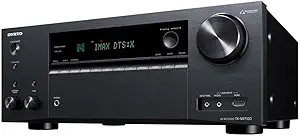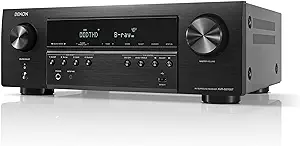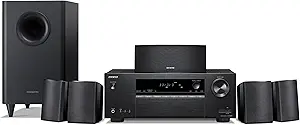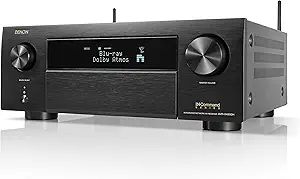The Onkyo AV receiver and Denon AV receiver are both reputable brands in the audio equipment industry, each with its unique features and technological advancements. Onkyo AV receivers are known for their high-resolution audio support and dynamic audio amplification. They utilize technologies such as THX Certified Select for theater-reference sound and AccuEQ Advance for room acoustic calibration. On the downside, some users have reported issues with the HDMI board, which may affect the longevity of the device. On the other hand, Denon AV receivers are recognized for their exceptional sound quality and advanced features, including 3D audio formats like Dolby Atmos, DTS:X, and Auro-3D. They also boast HEOS technology for multi-room audio and Audyssey MultEQ for room acoustic measurement and correction. However, Denon receivers are often more expensive than their Onkyo counterparts, which may be a deterrent for some buyers. Comparatively, both brands offer excellent audio performance, but Denon tends to have more edge in terms of advanced features and technologies.
Product Selection
Onkyo and Denon AV receivers are both reputable brands in the audio equipment industry, each with a broad product selection that caters to different user needs. Onkyo AV receivers are known for their high-quality sound performance, featuring the latest technologies such as Dolby Atmos, DTS:X, and THX Certified Select for a cinematic audio experience. They also offer a range of models from entry-level to high-end, allowing customers to choose based on their budget and requirements. However, some users have reported reliability issues with Onkyo receivers, which may affect the brand's overall reputation. On the other hand, Denon AV receivers are recognized for their exceptional audio quality and innovative features such as HEOS multi-room technology, Audyssey MultEQ room calibration, and support for the latest video standards including 8K and HDR. Denon's product selection is also diverse, with models designed for both home cinema enthusiasts and professional audio engineers. However, Denon receivers are generally more expensive than Onkyo, which may be a deterrent for budget-conscious customers. Compared to other brands, both Onkyo and Denon offer a wider product selection, but Denon is often praised for its superior build quality and advanced features.
Availability
Onkyo AV Receivers and Denon Televisions are both well-established brands in the audio equipment category, and their products are widely available across various retail platforms. Onkyo AV Receivers, known for their high-quality sound and latest technologies such as Dolby Atmos and DTS:X, are readily available both online and in physical stores. Major retailers such as Amazon, Best Buy, and Walmart carry a range of Onkyo models, making it easy for consumers to compare prices and features. However, the availability of specific models may vary depending on the region and the retailer's stock. On the other hand, Denon Televisions, while not as widely available as Onkyo AV Receivers, are known for their superior sound quality and innovative features such as HEOS built-in for wireless music streaming. They are primarily available through online retailers such as Amazon and the Denon official website, and select models can also be found in high-end audio equipment stores. The availability of Denon Televisions is more limited compared to Onkyo AV Receivers, and consumers may need to do a bit more research to find the specific model they are interested in. However, the brand's commitment to quality and innovation makes it a worthy consideration for those seeking top-tier audio equipment.
Design/Look
When it comes to the design aspect of audio equipment, both Onkyo and Denon AV receivers have their unique styles and functionalities. The Onkyo AV receiver is known for its robust and sturdy design, featuring large and easy-to-use knobs and buttons. The latest models come with a clean, sleek front panel and a well-organized back panel, making it easier for users to connect various audio devices. On the downside, some users have mentioned that the Onkyo's design is somewhat bulky compared to other brands, which may not be ideal for those with limited space. On the other hand, Denon AV receivers are recognized for their minimalist and modern design. The front panel is typically streamlined with fewer buttons, relying more on the on-screen interface for control. The back panel is also well-labeled and easy to navigate for setup. Denon's latest models, such as the Denon AVR-X3700H, even come with a built-in HEOS technology for wireless music streaming, adding to its sleek design. However, some users have pointed out that the minimalist design could be a drawback as it requires more reliance on the remote control or app for operation. In comparison to Onkyo, Denon AV receivers are usually more compact and lightweight, making them a better fit for smaller spaces.
Price
When comparing the price of Onkyo and Denon AV receivers, it's important to consider the features and technologies each brand offers. Onkyo AV receivers are generally priced lower than Denon, making them a more affordable option for those on a budget. They also offer features such as Dolby Atmos and DTS:X support, 4K Ultra HD pass-through, and built-in streaming services. However, some users have reported issues with Onkyo's reliability and customer service. On the other hand, Denon AV receivers are typically more expensive, but they offer advanced technologies that justify the higher cost. These include Audyssey MultEQ room correction, HEOS multi-room audio, and eARC support for high-quality audio from your TV. Denon is also known for its high-quality build and excellent customer service. While the price may be a deterrent for some, many users find the additional features and superior build quality of Denon receivers to be worth the extra cost. Compared to other brands, both Onkyo and Denon offer competitive pricing, with Onkyo being a more budget-friendly option and Denon offering high-end features at a premium price.
Quality/Durability
Onkyo AV Receivers are well-known for their robust build quality and long-lasting durability. They are equipped with the latest technologies such as Dolby Atmos, DTS:X, and HDMI support for 4K/60 Hz, HDR, and BT.2020, which provide a high-quality audio experience. Onkyo receivers are also built with high-current amps that ensure accurate control of the speakers for precise, dynamic audio reproduction. However, some users have reported issues with HDMI board failures, which could be a potential drawback in terms of durability. On the other hand, Denon AV Receivers are also renowned for their quality and durability. They are equipped with advanced technologies such as HEOS wireless multi-room audio technology, Alexa voice control, and support for Dolby Atmos, DTS:X, and Auro-3D. Denon receivers are also recognized for their solid build, with a vibration-resistant design that reduces the adverse effects of heavy components within amplifiers so that the sound quality meets Denon's high standards. However, some users have reported issues with the user interface and network connectivity, which could impact the overall user experience. Compared to Onkyo, Denon AV receivers generally have a reputation for better reliability and fewer issues with component failures.
Reputation
Onkyo and Denon are two of the most reputable brands in the audio equipment industry, particularly known for their AV receivers. Onkyo, a Japanese brand, has a long-standing reputation for delivering high-quality sound and advanced features. Their latest models incorporate technologies such as Dolby Atmos, DTS:X, and THX Certified Select for immersive, cinema-like sound. However, some users have reported issues with the HDMI boards in certain models, which can affect the overall performance and longevity of the product. On the other hand, Denon, also a Japanese brand, is renowned for its high-fidelity audio equipment. Their AV receivers are praised for their exceptional sound quality, robust build, and innovative features. The latest Denon models come equipped with technologies like Audyssey MultEQ XT32, AL32 Processing, Dolby Atmos, and DTS:X for a superior audio experience. They also support 8K/60Hz and 4K/120Hz pass-through, making them future-proof. Denon's reputation is slightly marred by their higher price point and some users find their user interface less intuitive compared to other brands. Comparatively, both brands have a strong reputation in the audio industry, but the choice between the two often comes down to personal preference and budget considerations.
Warranty
Onkyo AV receivers offer a two-year warranty from the date of purchase, which is standard for most audio equipment manufacturers. This warranty covers any defects in materials or workmanship under normal use. Onkyo's warranty service includes both parts and labor, but it does not cover any damage caused by accident, misuse, or modification of the product. In terms of customer service, Onkyo has a reputation for being responsive and helpful, which can be a significant advantage when dealing with potential warranty issues. On the other hand, Denon AV receivers come with a three-year warranty, which is slightly longer than what Onkyo offers. The warranty covers parts and labor for any defects in materials or workmanship. However, like Onkyo, Denon's warranty does not cover damage caused by accident, misuse, or modification. Denon also has a good reputation for customer service, and they offer a convenient online system for submitting warranty claims. In comparison to other brands, the extended warranty period offered by Denon gives it a slight edge over Onkyo and other competitors in terms of warranty coverage.
Easy To Use
Onkyo AV Receivers and Denon AV Receivers are two leading brands in the audio equipment industry, both known for their high-quality sound and advanced features. However, when it comes to ease of use, there are some differences to note. Onkyo AV Receivers, with their intuitive user interface and clear, easy-to-follow instructions, are designed for simplicity. Their latest models include features like AccuEQ Room Calibration, which simplifies the setup process by automatically adjusting audio parameters to suit your room's acoustics. On the downside, some users have reported difficulties with the remote control, which can be less intuitive than the main interface. Denon AV Receivers, on the other hand, are praised for their user-friendly design, with a straightforward setup process and an easy-to-navigate on-screen interface. Their latest models feature the Audyssey MultEQ XT32 room correction technology, which, similar to Onkyo's AccuEQ, automatically adjusts audio settings to your room. However, Denon's technology is considered more advanced, offering more customization options. One downside of Denon AV Receivers is that their advanced features can be overwhelming for some users, potentially making the system more complex to use than Onkyo's. Compared to other brands, both Onkyo and Denon stand out for their commitment to user-friendly design, but Denon's advanced features may give it a slight edge for those willing to navigate its complexity.
Denon 2400 vs Onkyo 787
Conclusion
Onkyo and Denon AV receivers are both highly respected in the audio equipment industry, each offering their unique strengths. Onkyo AV receivers are known for their high power and dynamic audio performance, with the latest models featuring technologies such as Dolby Atmos, DTS:X, and THX certification. They also offer HDMI support and a user-friendly interface. However, some users have reported issues with the durability of Onkyo receivers, which may affect their long-term performance. On the other hand, Denon AV receivers are renowned for their exceptional sound quality and advanced features. The latest Denon models come equipped with technologies such as HEOS wireless multi-room audio, Audyssey room correction, and support for high-resolution audio formats. They also offer a more extensive selection of inputs and outputs compared to Onkyo. However, Denon receivers are generally more expensive, and their user interface can be complex for beginners. Compared to other brands, both Onkyo and Denon stand out for their commitment to high-quality audio performance and cutting-edge technologies.



















